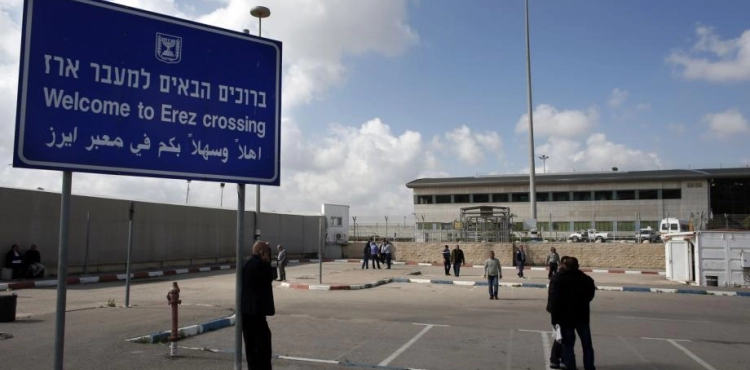The Palestinian Center for Human Rights confirmed today, Wednesday, the death of the patient, Hassan Ahmed Al-Kharti (62 years old), who was suffering from a cancerous tumor in the throat and tongue, yesterday, Tuesday, after the occupation prevented him from traveling through the Beit Hanoun checkpoint. Erez to Al-Makassed Hospital in occupied Jerusalem for treatment.
According to the center, Al-Kharti received a referral to complete treatment at Al-Makassed Hospital, and the Coordination and Liaison Department at the Ministry of Health submitted a request for him to travel on May 27, 2021, but the occupation authorities did not approve of it.
According to PCHR’s follow-ups, the Israeli authorities closed the Beit Hanoun “Erez” crossing on 11/5/2021, coinciding with the start of the war on the Gaza Strip, and prevented the passage of all the limited groups that allowed their passage, including patients, who were referred for treatment abroad.
After the end of the aggression, the occupying authorities announced that they would allow the passage of urgent cases “to save lives.” However, the reality indicates that the occupation authorities refused to respond to dozens of requests submitted by the Coordination and Liaison Department in the Ministry of Health for patients suffering from serious diseases, and there is no treatment for them in Gaza Strip hospitals. , and transferred for treatment in Israeli hospitals, hospitals in the West Bank, occupied Jerusalem, and abroad.
The occupation authorities allowed the passage of only 13 patients, out of 191 requests, which the Coordination and Liaison Department at the Ministry of Health submitted to the Israeli authorities during the period 25-30/5/2021.
The Center received complaints from patients or wounded people who were injured during the period of the aggression on the Gaza Strip, calling for urgent intervention to ensure that they travel for treatment abroad after their health conditions deteriorated and the hospitals of the Strip were unable to provide them with treatment.
The center succeeded in obtaining travel approvals for 5 seriously ill and wounded patients, after filing complaints with the legal authorities and the Israeli Public Prosecution.
The center also submitted an objection to the competent Israeli legal authorities about preventing patients from traveling, and is now awaiting a response.
The Center indicated that among the patients who are currently prevented from traveling to receive or complete their treatment in hospitals outside the Gaza Strip, there are about 8,700 cancer patients, who do not have a complete and appropriate therapeutic alternative in the hospitals of the Strip, and their health conditions require periodic access to chemical doses and radiotherapy, as they suffer These are from the deterioration of their health conditions, and there is a real fear for the lives of dozens of them if they are not able to travel immediately to complete their treatment protocols.
The center said that these restrictions coincide with the serious deterioration of the health system in the Gaza Strip resulting from the siege policy imposed by the Israeli occupation authorities on the Strip for 14 years, and also as a result of the repercussions of the internal Palestinian division, and medical facilities suffer from a permanent shortage in the list Essential medicines, medical devices, and the lack of specialized medical staff, which led to the inability of hospitals to treat many serious diseases, and thus the increase in the number of patients referred for treatment abroad in recent years.
The Israeli military aggression aggravated the health conditions and increased the burdens placed on the medical staff and the medical system, as a result of overcrowding in hospitals and intensive care rooms with hundreds of wounded, who were injured during the Israeli bombings.
The total number of victims of the Israeli aggression reached 247 martyrs, including (66) children and (39) women, and (1417) were injured, including (277) children and (412) women.
According to Ministry of Health sources, hospitals and medical centers in the Gaza Strip are currently suffering from a serious shortage of 45 percent of the list of essential medicines, 33 percent of medical consumables, and 56 percent of laboratory and blood bank supplies.
These restrictions also coincide with the aggravation of the electricity crisis due to the suspension of the power plant’s work due to the Israeli authorities’ ban on the supply of fuel needed for its operation, threatening to stop the treatment service for hundreds of patients, including cancer patients.
The Palestinian Center for Human Rights said that it is following with great concern the Israeli occupation authorities´ continued prevention of patients in the Gaza Strip, who suffer from serious illnesses, from traveling for treatment outside the Strip.
The center fears that this will affect the lives of hundreds of patients, especially those who suffer from cancerous tumors, for whom there is no treatment in Gaza hospitals.
PCHR considered that the continued closure of the Beit Hanoun "Erez" crossing constitutes a form of collective punishment and acts of reprisal perpetrated by the occupation forces against Palestinian civilians.
The Palestinian Center for Human Rights called on the international community to pressure the occupying authorities to open the Beit Hanoun crossing, and to allow the patients, their companions, and the injured to leave for treatment outside the Gaza Strip, calling on the Israeli authorities to stop using the policy of collective punishment imposed on the residents of the Strip, including closing the crossings. Which leads to a serious deterioration in the civilian population´s enjoyment of its economic and social rights.












